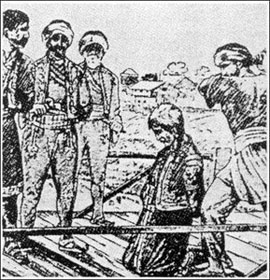Dahije
| Dahije | |
|---|---|
| dahije | |

Dahije beheading a Serb knez (Slaughter of the Knezes).
|
|
| Active | 15 December 1799 — 5–6 August 1804 |
| Leaders | |
| Headquarters | Belgrade |
| Originated as | Janissary corps of the Sanjak of Smederevo |
| Allies | Osman Pazvantoğlu's Janissaries (Pashaluk of Vidin) |
| Opponents |
Ottoman Empire Local Serbs |
The Dahije (Serbian Cyrillic: Дахије) or Dahijas were the renegade Janissary officers who took power in the Sanjak of Smederevo (also known as the Belgrade Pashaluk), after murdering the Vizier Hadži Mustafa Pasha of Belgrade on 15 December 1801. The four supreme dahije leaders were Kučuk Alija, Aganlija, Mula Jusuf and Mehmed-aga Fočić. Rebels against the Ottoman sultan, they were defeated by the Serbs in the initial phase of the First Serbian Uprising, which is also called "Uprising against the Dahije" (ustanak protiv dahija).
The renegade janissary leaders were called dahije, from Ottoman Turkish , meaning "uncle". The lesser janissary commanders were called kabadahije (s. kabadahija), referring to the Turkish phrase "kabadayı", a colloquial phrase for bullies.
In 1788, during the Austro-Turkish War (1787–1791), Koča's frontier rebellion saw eastern Šumadija occupied by Austrian Serbian Free Corps and hajduks, and subsequently, most of the Sanjak of Smederevo was occupied by the Habsburg Monarchy (1788–91). The Siege of Belgrade from 15 September to 8 October 1789, a Habsburg Austrian force besieged the fortress of Belgrade. The Austrians held the city until 1791 when it handed Belgrade back to the Ottomans according to the terms of the Treaty of Sistova. With the return of the sanjak to the Ottoman Empire the Serbs expected reprisals from the Turks due to their support to the Austrians. Sultan Selim III had given complete command of the Sanjak of Smederevo and Belgrade to battle-hardened Janissaries that had fought Christian forces during the Austro-Turkish War and many other conflicts. Although Selim III granted authority to the peaceful Hadži Mustafa Pasha (1793), tensions between the Serbs and the Janissary command did not subside.
...
Wikipedia
